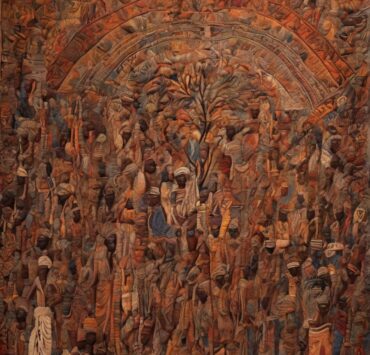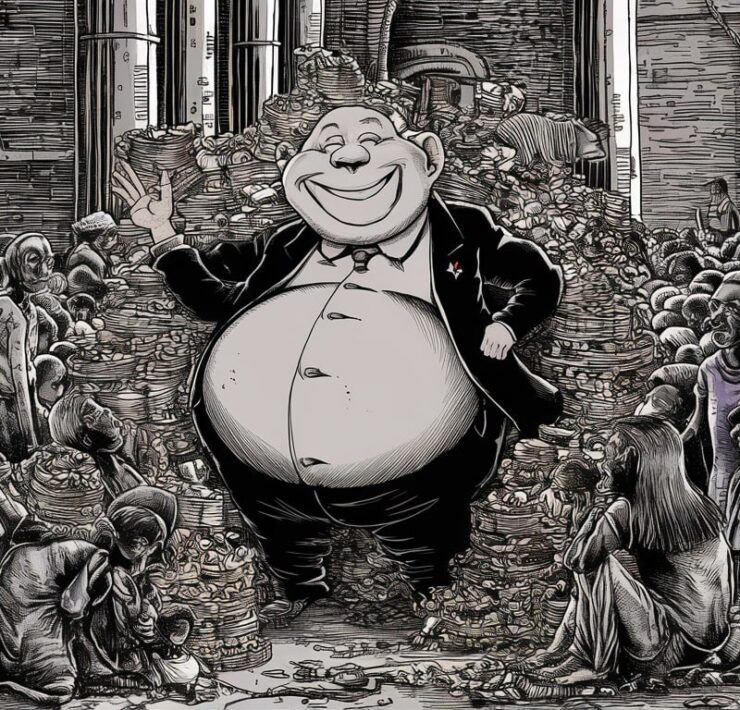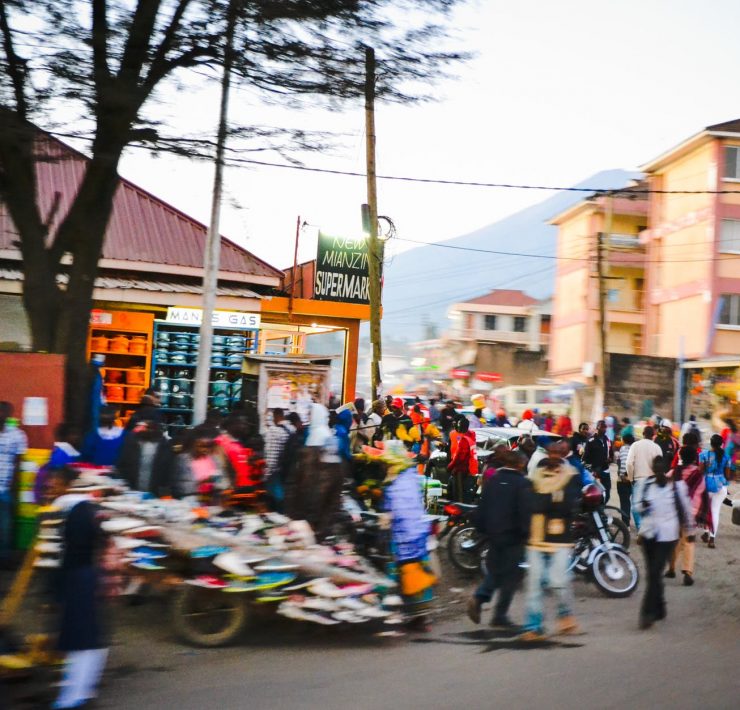AFRIKAN EKONOMIC HUMANISM

Dr. Bhengu is an Independent Researcher on Afrikan philosophy, Afrikology…
Introduction
In developing my argument I rode on the broad shoulders of Karl Polanyi’s work (The Great Transformation, (1944). Polanyi made a clarion call that was not heeded, when he said: “Not economic exploitation, as often assumed, but the disintegration of the cultural environment of the victim is then the cause of degradation. The economic process may, naturally, supply the vehicle of destruction, and almost invariably economic inferiority will make the weaker yield, but the immediate cause of his undoing is not for that reason economic; it lies in the lethal injury to the institutions in which his social existence is embodied. The result is loss of self-respect, whether the process springs from “culture conflict” or from the change in a position of a class within the confines of society”.
Ascendancy of Western Capitalism
The Berlin Conference of 1884-1885 legitimized the creeping European economic and political dominance in Africa and obstructed the normal historical thrust and continuity of African societies, whether in cultural developments, economic growth, or state-building. With an unquestioned belief in their own self-righteousness and the depravity of Africans, Europeans were determined to change indigenous institutions and behavior and thus saw themselves as agents of civilization. This conclusion meant that Africans had to be taught different values, goals, and modes of behavior. This was a deliberate destruction of African cultural values, traditions and customs. Since then, Africans are still demanding for respect of their culture. This psychological factor was probably the greatest legacy Europeans left in Africa
The crashing of the capitalist market fundamentalism in 2008 and the crashing of the Soviet style command economy by the end of 1980s, has led to many of the Afrikan people to believe that it is now the time for a moral economy.
The emergence and ascendancy of Western capitalism (neo-liberal economics), simultaneously with colonialism, on the African continent, African ethics and economic relations were dislocated and put almost into non-existence. African countries and Africans in general, were forced to embrace Western capitalism holus bolus, and as such, a vacuum was created in the African economic system.
The rapacious and venal individualism we are experiencing, will only be resolved by a rediscovery of an “African identity” and the building of a society that is “new not only in its economic arrangements, but also in terms of the values it upholds”, namely the Ubuntu value system, which is an African philosophy that teaches us (the human race)that we are one moral universe, and our shared moral sense makes us recognize our duty to the Other. Its world-wide known maxim is: Umuntu ngumuntu ngabantu – (I am because you are, you are because we are).
Development paradigms in Africa have been grounded in Western political and development traditions that failed to take cognizance of Africa’s cultural and historical background. African countries are often advised to embrace the neo-liberal economic credo for them to escape from the trap of underdevelopment. However, the economic success of South East Asia on the one hand and the failure of economic development in sub-Saharan Africa on the other, are increasingly proving that the ‘economic’ argument cannot be taken dogmatically: self-interest and market rationality do not seem to be the sufficient explanations for economic development.
Western capitalism is antithetical to African communal life as advocated in the African ethic of Maat/Ubuntu/Utu. It almost disrupted and uprooted African ethics, since capitalism tends to be a science of self-interest, of how to best accommodate individual behaviour by means of markets and the commodification of human relations. Secondly, Africans fail to reconcile their culture with Western capitalism, hence capitalism fails to thrive in an African setting,
Afrikan-Oriented Ekonomic System
The ancient Afrikan economic system was widely anchored on the principles of economic democracy. The basic premise of this notion is the study of economic processes in relation to the social and cultural contexts in which they occur. After viewing the principle of self-interest against its historico-cultural background, one considers this link in the African context, and argues that, although they cannot be taken as the sole factor, people’s cultural beliefs and values are crucial for economic development. Economic growth and development need to be a substantiation of a people’s beliefs and values (The Dialectics of Cultural Economy, 2014)
This conflicting situation created a need, particularly during the post-apartheid era, to look at a possibility of an alternative economic paradigm, that would be grounded and rooted on African ethics, values and culture. By the way, culture gives a people self-identity and character. It allows them to be in harmony with their physical and spiritual environment, to form the basis for their sense of self-fulfillment and personal peace. It enhances their ability to guide themselves, make their own decisions, and protect their interests. It’s their reference point to the past and their antennae to the future.
In Afrika, profit was not appropriated by a single individual or by corporate owners, as it is the case in Western capitalism, nor was it appropriated by the state, as in the East. In indigenous Afrika, profit was shared between the owners and the workers. It is in this sense, therefore, that we pursue humanistic perspectives, which centres upon human person and around human welfare (Walter Rodney, Ayitteyi, etc).
As does conventional economics, we stress human agency and autonomy. We believe in a greatly enriched human nature that takes morality seriously and that is consistent with human dignity.
Socially embedded economics seeks unity in the forces of human nature. We have a strong conviction that economic thinking and discourse cannot be carried out in an ethical vacuum, and that it is this explicit ethical foundation which is so distinctive for socially embedded economics as an alternative to ordinary economics.
What is called ‘economics’, as it is taught in our learning institutions (Herbert Vilakazi), is simply a reflection of the economic experiences of the European community, which in itself is an extension of the economic experiences of developed Western countries. The challenge for us in Africa, is to develop a new economics, which shall be a reflection of the economic experiences of the overwhelming majority of society, the African people. Our economics must begin with an accurate knowledge of the situation and needs of the overwhelming majority of Africans in rural and semi-rural areas, and in the townships of urban areas.
The Effects of the Encounter
Through Western capitalism (which embodies Western culture), African ethics and African economic relations (which embody African culture) were disrupted and put almost into non-existence, because capitalism tends to be a science of self-interest, of how to best accommodate individual behaviour by means of markets and the commodification of human relations. Much of it still reflects the particular philosophical tradition of British culture inaugurated by Hume and his followers (Vilakazi). There is no room for a logic of human values and rationally founded ethics. Human aspirations are watered down to shopping behaviour and channelled into stale consumerism.
The disadvantaged culture, which is African culture, could not assimilate totally the dominant Western culture. This has led to the dislocation of African culture, which led Africans to struggle and fight for their cultural renaissance and liberation, within the context of economics, whilst the dominant culture, pushes forward with its existent dominant cultural way of doing things. Cultural domination entailed the distortion of the personality of a part of the African peoples, their history, systematically disparaged and suppressed, their religious and moral values, attempted to replace progressively and officially their language with that of the colonizer, thus rendering them powerless and stripping them of their raison d’etre. This encounter, as we have seen in parts of Africa, results into what is called creolisation, which creates another different type of a problem.
We need to ask ourselves why capitalism thrives so well in Europe and fails so much in Sub-Saharan Africa? Why there are no Spaza shops in Europe?
The following are effects of such encounter:
(1) The Africans/Third World countries become disadvantaged,
(2) Western capitalism gets stunted and fails to thrive in an African setting/Third World situations, and
(3) The global economic order is, thus, not in balance.
Pillars of Afrikan Economic Humanism
(a). It believes and maintains that any harmful action against another individual is a threat to the whole society; a restriction on individual’s economic activity places severe constraints on the economic welfare of the whole society; if the individual prospers, so does his/her extended family and the community; an individual could prosper so long as his/her pursuit of prosperity does not harm or in conflict with the interests of the community; the society’s interests have to be paramount; unless an individual’s pursuit of prosperity conflicts with society’s interests, the State must intervene.
(b). It seeks to move our society forward to a higher and reconciled form of society, in which the quintessence of the human purpose reasserts itself in a modern, free and democratic economic context and to create a new society that is humane, just and harmonious.
©. It believes that an action is good if it preserves the totality, fullness and the harmonious life of a human person; an action is bad if it has a more or less decided tendency to break into and narrow the totality and fullness of humanism.
Conclusion
Therefore, we believe that for Africa to have universal power, it would have to have a strong African-oriented ‘substantivist’ economic philosophy, that is culturally rooted and grounded in an African idiom.
The challenge is to continue from where Karl Polanyi ended, i.e. develop our locally-based African economic constitutive rules, untangle the Western capitalist constitutive rules, and then set in place new economic constitutive rules, which would be globally competitive and create an equilibrium in the global economic order. What a mammoth task! These two cultural economic worlds have remained separate because their values are not compatible. In South Africa we still talk of a country of “two nations” or a country “with two cultural economies”, i.e. the First Economy (Western Cultural Economy) and the Second Economy (African Cultural Economy).
What's Your Reaction?
Dr. Bhengu is an Independent Researcher on Afrikan philosophy, Afrikology and Egyptology. He is an established and experienced author, self-publisher and managing director of Phindela Publishing Group & Editor-in-Chief of INQABA Journal, a quarterly publication that specializes on Afrikology. He describes himself as an Afrikan of Nguni (Zulu) extraction, but then a global citizen. Black, but being in total fusion with the world, in sympathetic affinity with the Earth... “I am black not because of a curse, but because my skin has been able to capture all cosmic eluvia. I am truly a drop of the sun under the earth.” He says.


















